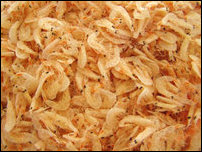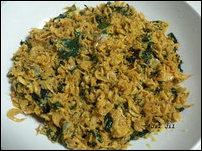
Koonith-theevu
Kooni+theevu
The island of Kooni shrimp
| Kooni | Also Kooni-I’raal, Koonip-podi: A small shrimp (Tamil, Winslow); Common shrimp, Crangon vulgaris, as hunched-backed (Tamil, Madras Tamil Lexicon); Koo’niyaa: Also Koo’nissaa: (singular) Very small kind of shrimp (Sinhala, Koo’ni+issaa; Issaa > shrimp, prawn in Sinhala); Koo’ni, Koo’nissoa: Plural of Koo’niyaa/ Koo’nissaa (Sinhala); Kunu-mællaa: Snail (Sinhala); Koon: Bend, curve, hump on the back, humpback, snail (Tamil, Dravidian Etymological Dictionary 1927); Cognates and derivates in many Dravidian languages (DED 1927) |
| Theevu | Island (Tamil, Changkam Diction and modern; Pu’ranaanoo’ru 397: 21-22; Dveepa: Island, peninsula, sandbank (Sanskrit); Deepa/ Deeva: Island (Prakrit); Dveepa/ Dveepaya/ Doopata/ Divaina: Island (Sinhala); Doova: Island, any small spot of ground or bank surrounded by water (Sinhala); Theev: Island (Malayalam); Dhoo/ Dhuvu/ Dhuvaa/ Doo/Dheefu /Theemu: Island (Dhivehi / Maldivian) |
| Theevu | The term may also have affinities to the following words of Dravidian etymology, listed by Dravidian Etymological Dictionary, entry No 3229: Thippai: Mound, elevated ground (Tamil); Tip: Rubbish heap (Kodagu); Tippe: Heap, hillock, dunghill (Kannada); Dibba, Dibbu: Eminence, hillock (Kannada); Tevaru, Tevari: Rising ground, hillock (Kannada); Tippe: Heap, pile, hill (Tulu); Tuppe: Stack, heap of corn, rice (Tulu); Tippa: Hill, hillock, rock, mountain, heap, mound, small island (Telugu); Dibba: Hillock, mound, heap (Telugu); Dippa: Heap (Parji); Dibba: Mound (Parji); Dibbe: Hillock (Gadba); Dippa: Highland for cultivation, forest, field (Gondi); Deebe: heap (Gondi); Depa: Rising ground, high land, lower slopes of a hill, shore, earth platform, veranda, dais (Kui); Debbe: Hill (Kuvi); Baali dibba: Sandhill (Kuvi); Dippaa: Mound, hillock (Kurux); Tube: A heap of filth or sweepings (Malto) |
Kooni in Tamil and Koo’niyaa in Sinhala mean a very small kind of shrimp.
The words have come from the root Koon of Dravidian etymology (DED 1927), which in Tamil and many other Dravidian languages mean bend, curve, hunchback etc. The Tamil verb Kuni from the same root means to bend, to stoop down etc.
Kooni became the name for shrimp because of the bent or hunched-backed form of it. Note that one of the meanings for Koon in old Tamil (Thivaakaram lexicon 3:210) and Kunu-mællaa in Sinhala, stand for a snail, which is also hunched-backed. Early examples for anything bent gaining the name Kooni in Tamil could be seen in the Changkam literature:
“Veanit paathirik kooni maamalar” (the big Kooni/ curved flower of Paathiri that blossoms in summer; the Trumpet Flower or Binonia chelonoides; Akanaanoo’ru 257:1)
வேனிற் பாதிரிக் கூனி மாமலர் (அகநானூறு 257:1)
Example for Kooni meaning shrimp in Tamil literary usage could be found in Kuttaalak Ku’ravagnchi, line 94: “Kooni koththi…kokkirukkum pa’n’nai” (the water body where cranes peck Kooni shrimp).
"கூனி கொத்தி…கொக்கிருக்கும் பண்ணை" (குற்றாலக் குறவஞ்சி, 94)
Even though generally means a shrimp, in contemporary Tamil usage Kooni specifically stands for the very small variety of shrimp.
Kooni-I’raal (the kooni shrimp; I’raal: shrimp) or Kooni-podi (the tiny kooni; Podi: tiny) in Tamil and Koo’ni-issa (Issa: shrimp) in Sinhala are other specific terms for this kind of shrimp.
Kooni comes in shoals in the sea and are caught in bulk.
This delicious food item is marketed and exported in raw, dried, boiled and dried or pickled forms, under the names Kooni Shrimp or Baby Shrimp.
Koonip-puddu (spiced scramble of boiled Kooni) is a preferred bite in the folk taverns of Tamil Nadu.
Theevu, generally meaning an island, is a word found used in Tamil since the times of the Changkam literature:
“Vaayvaa’l valampadu theevin polampoo’n va’lavan” (the king, Ki’l’li Va’lavan who bears the gold obtained from an island which he conquered by his sward; Pu’ranaanoo’ru, 397: 21-22)
"வாய்வாள் வலம்படு தீவின் பொலம்பூண் வளவன்" (புறநானூறு, 397: 21-22)
Theevakam and Theevam are other words that come in Ma’nimeakalai (25:131, 21:90).
The words are obviously connected to Dveepa in Sanskrit and Theepa/ Theeva in Prakrit. However, etymological connections could also be cited for these words with Thippai, Tippe, Tippa, Deebe, Tube etc found in many Dravidian languages to mean heap, mound island etc., that are listed as words of Dravidian etymology (DED 3229). See table.
Koonith-theevu is a village, close to Champoor in Moothoor division of Trincomalee district.
It is a coastal place facing the Koddiyaarak-kudaa (Koddiyar Bay) of Trincomalee. Today’s village of Kooniththeevu is not exactly an island, but there are two un-named islands adjacent to its coast, one located approximately at 100 metres and another at 500 metres distance.
Besides, many places in the region, such as Poovarasan-theevu, Kuruvith-theevu, Kokka-theevu, Mallikaith-theevu, E’riya-theevu-malai, etc are not exactly islands, but just water surrounded areas, sometimes seasonally, in the delta of Mahaveli River.
The neighbouring place of Kooniththeevu is called Choodaik-kudaa, which means the bay to catch Choodai fish (Sardine, Sardinella albella)
Know the Etymology: 179
Place Name of the Day: Tuesday, 11 January 2011
First published: Tuesday, 11 January 2011, 06:30




No comments:
Post a Comment